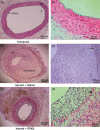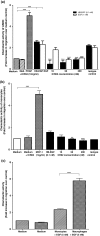Periadventitial delivery of anti-EGF receptor antibody inhibits neointimal macrophage accumulation after angioplasty in a hypercholesterolaemic rabbit
- PMID: 20002649
- PMCID: PMC2884090
- DOI: 10.1111/j.1365-2613.2009.00700.x
Periadventitial delivery of anti-EGF receptor antibody inhibits neointimal macrophage accumulation after angioplasty in a hypercholesterolaemic rabbit
Abstract
Monocyte recruitment and their differentiation into macrophages are both early events in native and accelerated atherosclerosis that follows angioplasty. We have investigated the putative functional role of the epidermal growth factor receptor (EGFR) present on rabbit monocytes/macrophages. The impact of periadventitial delivery of an EGFR-specific, blocking monoclonal antibody (ICR62, which inhibits EGF-binding to its receptor) was investigated in a rabbit model of accelerated atherosclerosis induced by a combination of carotid injury and 4 weeks of a 2% cholesterol-diet. Two weeks after the initiation of the diet, a balloon-catheter angioplasty of the left common carotid artery was performed and a collar placed around the injured carotid artery immediately, for the delivery of ICR62 antibody, isotype-matched antibody or saline control. Monocyte/macrophage accumulation, cell proliferation and neointimal thickening were determined 2 weeks after the delivery of the antibodies. The function of the EGFR on rabbit monocytes was also investigated in vitro, using chemotaxis assays. Treatment with ICR62 was associated with a significant reduction in macrophage accumulation and neointimal thickening and a 76% reduction in neointimal area of the vessel wall compared with controls. In vitro ICR62 inhibited macrophage and smooth muscle cell migration towards EGFR ligands including EGF and HB-EGF. These findings suggest that EGFR ligation may be important in the development of early atherosclerotic lesions following balloon-catheter angioplasty, and periadventitial delivery may provide a feasible approach for administration of the inhibitors of EGFR-binding such as ICR62.
Figures





References
-
- Biwa T, Sakai M, Shichiri M, Horiuchi S. Granulocyte/macrophage colony-stimulating factor plays an essential role in oxidized low density lipoprotein-induced macrophage proliferation. J. Atheroscler. Thromb. 2000;7:14–20. - PubMed
-
- Chan AK, Kalmes A, Hawkins S, Daum G, Clowes AW. Blockade of the epidermal growth factor receptor decreases intimal hyperplasia in balloon-injured rat carotid artery. J. Vasc. Surg. 2003;37:644–649. - PubMed
-
- Charo IF, Taubman MB. Chemokines in the pathogenesis of vascular disease. Circ. Res. 2004;95:858–866. - PubMed
-
- Cunningham MP, Thomas H, Fan Z, Modjtahedi H. Responses of human colorectal tumor cells to treatment with the anti-epidermal growth factor receptor monoclonal antibody ICR62 used alone and in combination with the EGFR tyrosine kinase inhibitor gefitinib. Cancer Res. 2006;66:7708–7715. - PubMed
Publication types
MeSH terms
Substances
Grants and funding
LinkOut - more resources
Full Text Sources
Medical
Research Materials
Miscellaneous

